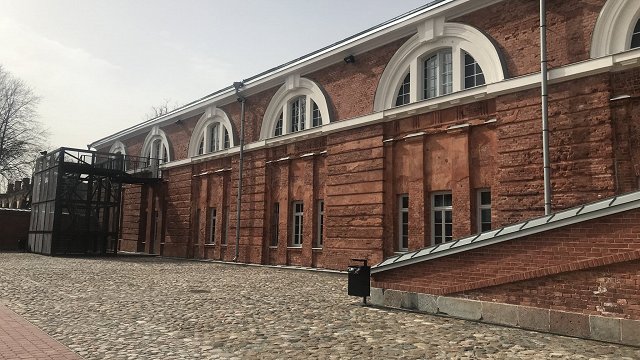Daugavpils
Ukraine flags in Daugavpils are hard to come by. The only municipal institution with one out is the art and design secondary school, according to Daugavpils Mayor Andrejs Elksniņš (Harmony), this school is the only one that had an interest in doing so. When the Ukrainian flag was hoisted by the Staņislavs Broks' music school, protests arose as it was hoisted in the place of the city flag. Activists had come to protest. Now the Latvian, European Union, Ukrainian, and Daugavpils flags are hanging side by side.
The dissatisfaction with Ukrainian flags in Daugavpils has not disappeared. Latvian Television was approached by a taxi driver Vitālijs, who doesn't like the flags as 'they [Ukrainians] have problems they caused themselves.'
"What has Rīga turned into – is it a Latvian or a Ukrainian city? [..] Good thing we only have one left. Oh, four? I took one off personally. There was just a Ukraine flag without Daugavpils or the Latvian flag," said Vitālijs.
The insurance company Balta confirmed the flag had been stolen from their facade. A police report was also found that seemed to match the incident.
Soon after Vitālijs, another man approached, calling the music school director Broks a Nazi. The director, Aivars Broks, said that this kind of attitude is probably the reason why there are not many flags. "At the same time, if the city immediately hoisted the Ukrainian flag at the local government building, it would end with that. There would probably be a couple of people shouting at it, and then they would see what was what. That common feeling, however, is that people are afraid to just say something, to do something," said Broks.
Daugavpils Mayor Andrejs Elksniņš initially did not want to talk about Ukrainian flags with LTV as the 'city is helping Ukrainian refugees with actions'. He said:
"The views are very different, and people who live in Daugavpils are also very different. We need to look at the population: of the 90 thousand inhabitants, 12.5 thousand are non-citizens, and the country is absolutely not going to do anything with them, to integrate in no way. Integration policy has, as you know, failed in this country. There are 6.5 thousand citizens of the Russian Federation in Daugavpils [..]."
May 9, which was set as the commemorative day of the victims of the Ukraine war throughout Latvia, was apparently just a regular 'Victory Day' in Daugavpils. Dubrovina Park, which has all three Ukrainian flags remaining in Daugavpils, has a memorial to Soviet soldiers, some are also buried in the park. On May 9, De Facto observed only a few cases of banned, and a few drunk and disorderly. Mayor Elksniņš himself was at the memorial on May 8 and placed the flowers early on the morning of May 9, explaining that his family history was forcing him to do so.
Rīga
On May 9, in Rīga, people went to lay flowers at the monument at Uzvaras park, but did so in a quiet manner and no major incidents were reported. However, after the municipal company Rīgas meži took the flowers away overnight, the situation escalated on May 10 with unauthorized gatherings, a celebration including the praise of the Russian military aggression.
The Harmony party blame Mayor Mārtiņš Staķis, who, in their opinion, had sent a tractor that cleared flowers. For example, the leader of the party and the head of the Saeima faction, Jānis Urbanovičs, said: “I was very offended by the disrespect, contempt for sending a tractor through the rows of flowers. And it made me sort of compensate [..]That's all. Everything else – I believe – has to be an individual responsibility. Those who sent the tractor – they are responsible for everything else. But there is still responsibility for those who overreacted to their indignation."
Regīna Ločmele, deputy of the faction led by Urbanovičs, is among those against whom the police have now initiated administrative proceedings. On May 10, she not only brought flowers to the monument but also engaged in the celebratory part. She acknowledged that what happened on 10 May was no longer a memorial but a protest event.
“I went to the first row, put my tulips down, and next to me was a woman I know, one of my 5,000 followers on social networks. Here we sang together... With me was a companion of my party, who also loves singing and playing guitar. Wartime songs – singing them in my family since my childhood. It's a cultural code that can't be deleted like: it's bad, please stop doing it. These are very serious, even human psychology-related issues,” Ločmele said.
Tuesday's protest at Uzvaras Park continued on Friday in Rātslaukums after the Riga City Council decided on the dismantling of the monument. Although the police denied access to the square, Latvian Russian Union's activists and supporters had arrived to Old Rīga, and some, including the party leader and Member of the European Parliament Tatjana Ždanoka were detained.




























